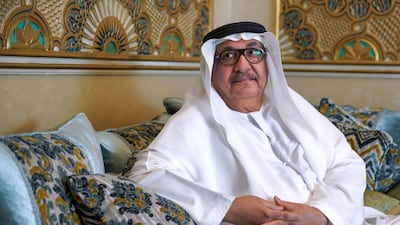Dr Muhammad Barzaiq has dedicated his life to serving others - and he shows no signs of stopping yet.
After working tirelessly in the UAE health sector for more than 40 years, it would be understandable if the energetic 78-year-old decided to take it easy.
But the father-of-four and grandfather of sixteen still has a burning desire to do good in the country that became home to him in the 1970s.
He has set his sights on opening an institute to pass on his knowledge to the next generation of health workers.
"Currently, I am studying a project of establishing a health institute to teach medical laboratory technology for high school graduates in Al Ain and I am awaiting financial funding for this project," he told The National from his home in Al Ain.
Dr Barzaiq, who is originally from Yemen, and achieved UAE citizenship in 1983, certainly has a deep well of knowledge to pass on.
“My journey started in 1975 when I left my city Aden to move to Abu Dhabi, where I was accepted to work in Al Ain Hospital in the laboratory section and the blood bank,” he said.
Dr Barzaiq quickly realised the urgent need to bolster blood donations in the country and reduce a reliance on supplies imported from overseas.
“In 1975 the Ministry of Health was importing blood from other countries such as America, Lebanon and Egypt, and we were getting weekly supplies of blood from Abu Dhabi Central Hospital,” he said.
In the beginning, he said it was difficult convincing residents of the need to donate.
“We explained the benefits of donating blood as well as its importance in saving the lives of patients,” he said.
He started reaching out to authorities and members of the public to stress the importance of his life-saving campaign.
“At the hospital, we sent the relatives of patients who need blood transfusions directly to the blood bank at Al Ain Hospital laboratory to try to persuade them to donate blood to because it was easier to match the blood group and not to waste time searching for other donors.
"Thank God we succeeded to the extent that we dispensed with the use of blood purchased from abroad.”
In 1978 along with the help of an investor, he opened the first laboratory in Al Ain, the Al Khaleej Medical Laboratory.
“We were turning away patients who required certain tests that were prescribed to them by the private sector and were only accepting those from government hospitals so I thought why not open a private laboratory to support the government and patients, both nationals and expatriates," Dr Barzaiq said.
"In 1980 I added to the laboratory a special section for X-ray and ultrasound and this section was also the first and only as a department of radiology in the private medical sector in Al Ain,”
He continued to manage and work at his laboratory up until last year and even after he sold it to another company.
“After I sold it, my condition was that I continue to manage it,” he said.
Last year the laboratory was forced to shut down. He describes it as one of the saddest moments in his life.
“The most difficult moment for me is having to that step to close the centre, which was considered a landmark of Al Ain, where this edifice remained for 41 years providing services to the citizens and expatriate in the city of Al Ain,” he said.
“I will never be prouder than when I set up this laboratory in my city, the city of Al Ain and providing a new service for the people of Al Ain that was not available at that time and earned me their support and love.”
Out of habit, residents still call him for testing.
“I also receive calls from people who did their tests at other labs asking me to explain to them the results of their checks and my advice.”
Forty-five years after embarking on his journey from Yemen, he is proud to be at home in the Emirates.
"I feel proud of myself for contributing in the building of one of the most vital sectors in the country. The development of the health sector is progressing significantly."

